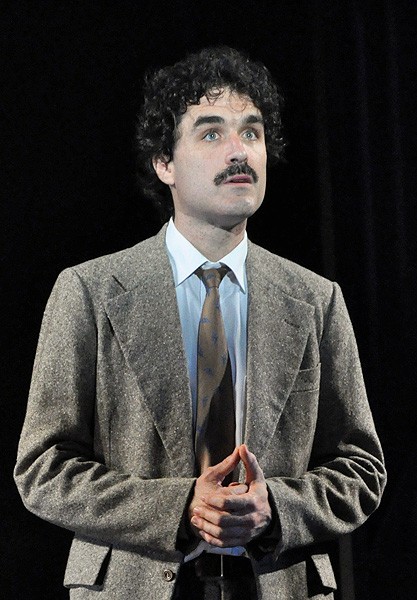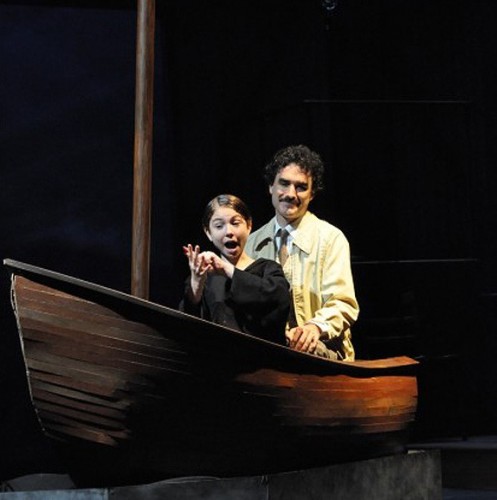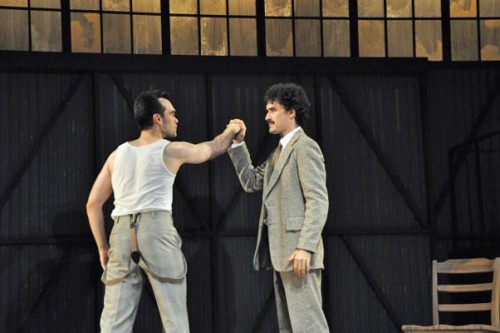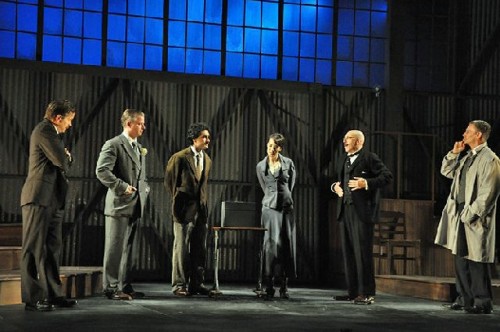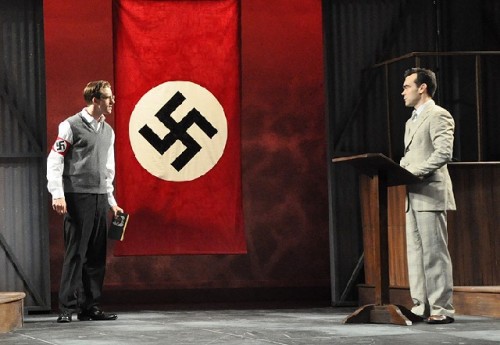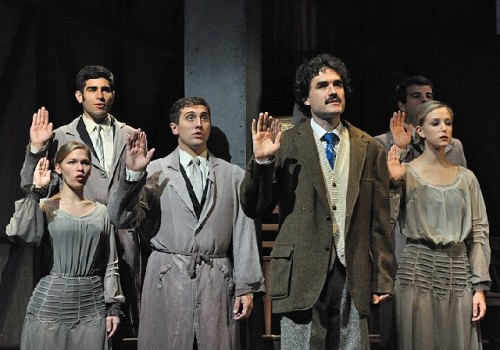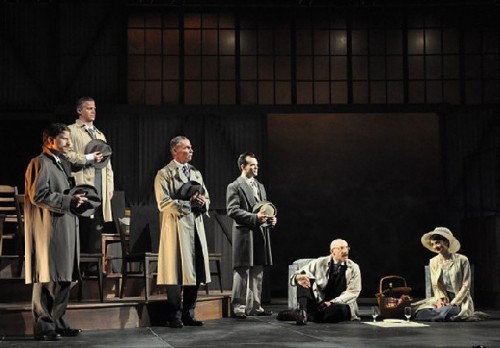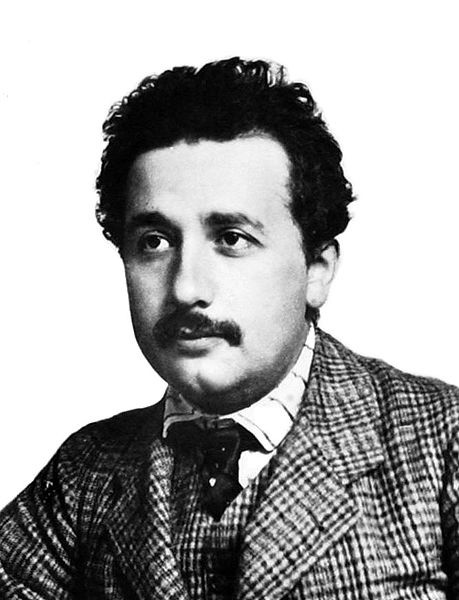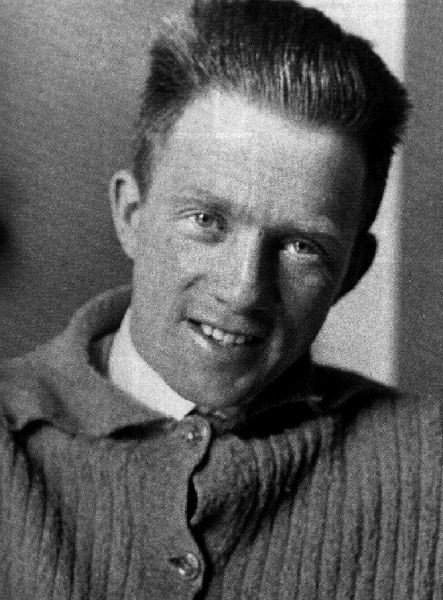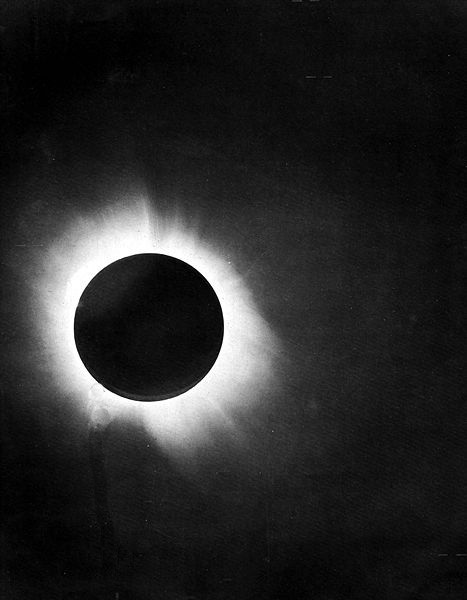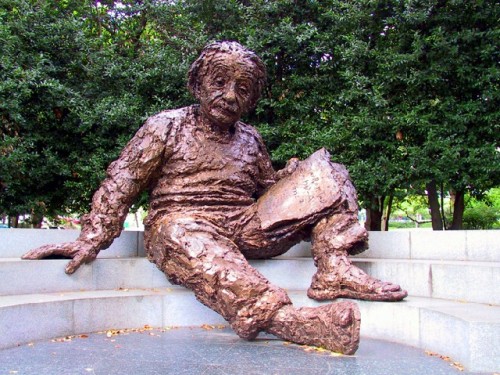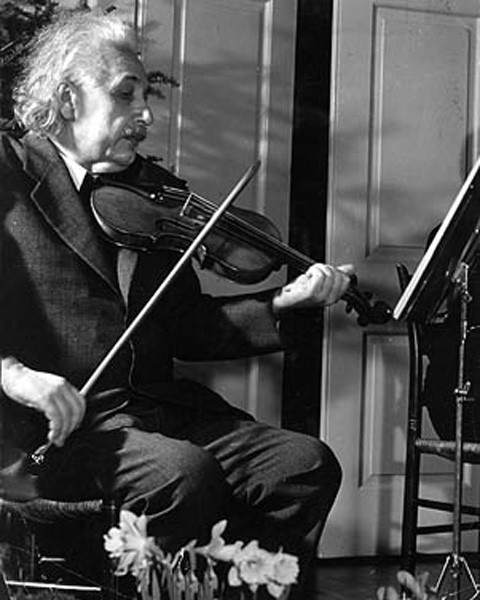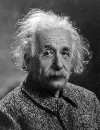The Einstein Project Opens at the Berkshire Theatre Festival
A Fascinating Exploration of an Iconic Figure and His Times
By: Larry Murray - Jul 05, 2009
The Einstein Project by Paul D'Andrea and Jon Klein, Directed by Eric Hill, Stage Manager - Jessica Kovell, Scenic Designer - Joseph Varga, Costume Designer - Charles Schoonmaker, Lighting Designer - Matthew E. Adelson, Composer/Sound Designer - J. Hagenbuckle, Movement - Isadora Wolfe, Assistant to the Director/Composer of Original Song - Dawn Loveland.
James Barry - Werner Heisenberg, Brandy Caldwell - Clara Immerwahr/Japanese Woman, David Chandler - Fritz Haber, Kyle Fabel - Max Von Laue, Jesse Hinson - Eighth Man, Walter Hudson - Otto Hahn, Tommy Schrider - Albert Einstein, Miranda Hope Shea - Edward Einstein, C.J. Wilson - Walter Gerlach, Members of the Ensemble: Megan R. Carr, Emily Grove, Cameron Harms, Betsy Lippitt, Tony Rios, John St. Croix. At the Berkshire Theatre Festival Main Stage in Stockbridge, MA from June 30-July 18, 2009. Running time about two hours with one fifteen minute intermission. http://www.berkshiretheatre.org/
Last presented in 2000 by the BTF, the Einstein Project smashes together historic moments of politics and physics for an explosive evening of theatrical and philosophical entertainment. It's been a decade since we last saw Tommy Schrider channel Albert Einstein, and his confrontations with Werner Heisenberg (James Barry) will either revive your interest in physics or make your brain hurt. The play, written by Paul D'Andrea and Jon Klein, reveals how easily scientists can become so absorbed into the problems of quantum mechanics and special relativity that they forget to eat, sleep and value what time they have with their wives and children.Einstein went through two wives, and had several children, one of whom appears in the script, but they were not the central focus of his life. Instead it is his fellow scientists and science itself that preoccupies him, people being of less importance, he admits, than science.
The play paints a portrait of Albert Einstein and his contemporaries during the period from 1920 to 1945 when the secrets of the atom, gravity, electromagnetism, and light were first being described scientifically. But the play is more of a suggestive collage than a formal lecture. We do hear six scientists debate various points of science but only briefly. Each character could easily be the subject of a play. But it is Einstein whose genius eclipses the others, at least in the public's mind, and so the play is mostly about him.
The narrative changes course frequently, like the orbit of electrons around an atom. In physics, whenever you try to shine a light on an electron, the light itself affects the movement and so it is never where it is supposed to be mathematically. (Heisenberg's Uncertainty Principle) At several points in the play, the theories pile up and the whole enterprise risks moving into a nerdy discussion, but we are mercifully spared as the focus changes rapidly. That is how the play is constructed, intricately. We open with the 1919 solar eclipse (which in fact proved Einstein's Relativity theory) then jump forward to the birth of the Atomic Bomb with writhing bodies in slow motion, than back to the Patent Office where Einstein worked. Or was it to the lake where Einstein and his son Edward (Miranda Hope Shea) are sailing? The bits and pieces of his life begin to add up, a picture begins to form, and before you know it, there is another bomb blast, a few parting words to his son who has reappeared, and it is over.
We come to see Einstein as a man whose relationship with his own son is critical and professorial, similar to his academic relationship with other scientists, which was often direct and contentious. We come to respect the man for being unaffected by the politics swirling all around him while decisions by the other scientists are less objective. Nevertheless, given the Second World War and the Nazis, Einstein writes to President Roosevelt urging him to look into creating an atomic bomb to have it before the Germans. His famous letter to the President was followed, a decade and a half later by another letter, this time to President Eisenhower, urging nuclear disarmament, signed by a handful of the leading thinkers of the time. One of the authors was George Wald, but more about him in a moment.
Throughout the course of the play, we hear Einstein refer to God, a bit of a surprise to some, because people assume he was an atheist. Indeed, you would think that the fundamentalist anti-science people would be at war with old Albert rather than Charles Darwin, since he thought the universe to be even older than the evolutionist had theorized. But as this play points out, Einstein's attempt to describe how the universe worked was, for him, an attempt to look into the mind of God and figure out what He was thinking. It is odd to think that God could be reduced to waves and particles, or the formula E = mc².
Einstein was humble, and at the end of the play he explains how he did not "discover" special relativity, but simply gave the already existing phenomenon a name and explanation. Einstein was a man who tried to reconcile his understanding of the universe with that of his Jewish upbringing. Few people remain alive today who worked with Einstein. 20 years ago I was fortunate to have frequent dinners with microbiologist and Nobel laureate George Wald and his equally brilliant wife, Ruth Hubbard. Both taught at Harvard. Over dessert he would relate the peripatetic discussions he and Einstein had on the existence of God, and a dozen reasons why the scientific evidence pointed to the presence of a great mind behind the phenomenon of life. Einstein never let go of his core belief that there was order behind the universe, not chaos. The play captures this belief very well.
In fact, the evening delivers many special moments: a Japanese Tea Ceremony, a meeting with ghosts at a graveside, and throughout, the humorous Pathé News clips proving America's fascination with celebrities is not new. It's just that we now focus on the fashionable and trivial lightweights, not the educated and meaningful who provide good role models and solutions to the world's problems. At least Einstein had some substance. The most dramatic moments in the play come during the exchanges between Einstein, (Tommy Schrider) and Heisenberg who is brilliantly played by James Barry. The actor even bears a striking similarity to the way Heisenberg looked when younger.
The clashes of the two great minds are all too brief but provide insights into the earliest days of trying to reconcile Relativity with Quantum Mechanics. The Uranium Club, of which Einstein was a member, debated both the makeup of the atoms in that unstable element, and its potential use in a weapon. The other scientists portrayed included Fritz Haber (David Chandler), Max Von Laue (Kyle Fabel), Otto Hahn (Walter Hudson), and Walter Gerlach (C.J. Wilson). An ensemble of six actors appeared frequently to represent the rest of the world, often engaging in slow motion walking, rising and falling and other stylistic clichés, usually with dim lighting. I felt guilty for not feeling anything even though these were meant to represent suffering people. Maybe they oozed when they should have twitched. And were as silent as mimes when perhaps they should have applied a few groans ala Grotowski.
The set had an industrial feel and was constructed so as to utilize virtually every inch of stage space, with platforms and two permanent structural columns that partially block a bit of the stage for some. There was also a large door that slid open and closed dramatically from which characters and props would appear and disappear. The music and lighting design was excellent, in constant service to the action on stage, never overtaking it, except for one pivotal moment towards the end of the play. There's a flash of light and roar of sound which symbolized the detonation of the Atomic Bomb and it had an unnerving effect on the audience.
Except for a few early walkouts - perhaps due to the contemporary nature of the play - the people enjoying the show were totally spellbound by the story as it unfolded. They barely moved, and as the saying goes, you could hear a pin drop. But the moment the flash of the bomb went off, the audience shrank back from the light, putting hands to their brows and moving uneasily in their seats. It was many seconds before they recovered and restored their focus. They had a visceral reaction, the dream of many a director. Eric Hill not only held their attention throughout, but delivered a potent coup de grâce.
In the end, this is a play about war, politics and the choices we make in life. Berkshires in 2009 is delivering a raft of 1940s themed plays, from this one on the A-Bomb to several on the Holocaust. I am the first to know that we must remember these events so that they are never repeated. Bravo for undertaking them!
Today, though, there are other issues dominating the headlines: continued genocidal events, the resurgence of religious wars and terrorism, and the dangers of global warming. There are also the hot button issues of greedy moneymen, free-market hucksters, white-collar thieves, and self-serving politicians. Who is writing about this?
Even more importantly, if they write it, will they come? Would you?
Last night before the performance began, State Representative "Smitty" Pignatelli gave an uplifting Independence Day speech, waving a little American Flag. He invoked the great patriots and the Declaration of Independence and urged us to re-read it. Theatre has always reflected the times in which plays are written. Here's hoping it won't be long before we can all see new plays by writers who examine the issues of America today, and help us understand them, and find answers to the big problems we face.
Quick Link to Berkshire Theatre Festival

